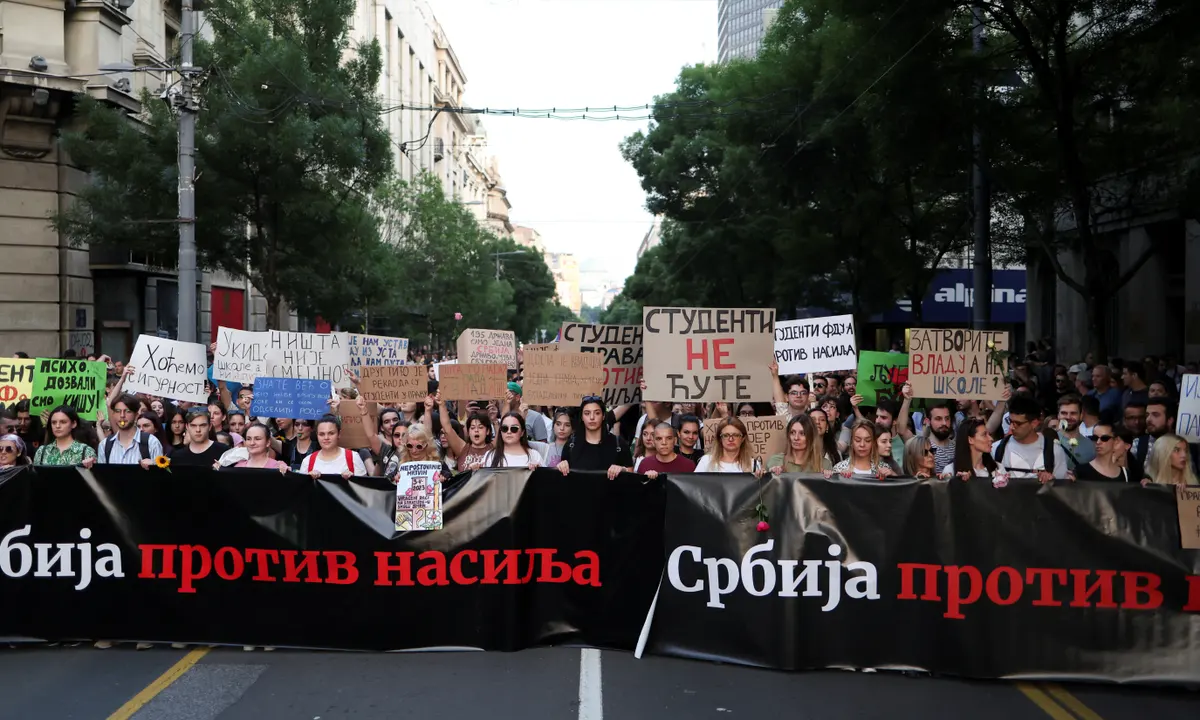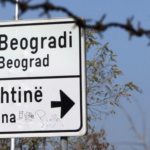In April 2022, Serbia held extraordinary elections. And now, on November 1, Serbian President Aleksandar Vučić declared another snap parliamentary election for December 17 and dissolved the State Assembly. In addition, the city of Belgrade and 64 other cities and municipalities will hold elections of local deputies. According to national legislation, voters must elect 250 members of the Assembly, represented by registered parties, movements, and electoral blocs. Electoral lists must be submitted to the Republican Election Commission (REC), for which it is necessary to collect at least 10,000 signatures, and for national parties it’s 5,000. At the same time, 40% of the spots on the electoral lists should be given to female candidates. In order to win a seat in parliament, one must beat a 3% threshold.
For the first time, President Vučić announced the possibility of early elections at the beginning of this year. But weekly rallies under the slogan “Serbia against violence” made the idea real. They started in May of this year after a schoolboy shot other children at a school in the center of Belgrade and several people were shot dead in Mladenovka. At the beginning, the participants of the massive rallies demanded prosecution of murderers and heads of law enforcement agencies, as well as the closure of several pro-government media. Over time, ordinary demonstrations transformed into a civil movement, and rallies turned into a visible opposition force that put forward political demands — to hold early parliamentary elections, ensure freedom of speech, free mass media from state control, improve the quality of life, guarantee security, fight corruption, organized crime, and other demands. The idea of holding early parliamentary elections has become dominant in the political life of Serbia.
The main reasons for holding elections
A real miracle happened – the opposition, which demanded a change of power and early elections, sealed support from President Vučić. But what were the reasons that led the opposition and the president of Serbia to the common idea of holding early elections?
The first reason is that the protests under the slogan “Serbia against violence” were a response to the public demand for a change of government and new reforms. People look up to those who solve problems, not state or ignore them. And it is the elections that create favorable conditions for this change.
The second reason is the deterioration of the socio-economic situation in Serbia. The country’s leadership has repeatedly mentioned “serious” economic problems – a slowdown in economic activity against the background of stable inflation, which has led to a deterioration in the quality of life and an increase in prices, primarily for food products, up to 20-25%, which significantly worsened the quality of life in the country and exacerbated the social and political situation.
The third reason is the need for settlement between Belgrade and Pristina. The West increased the pressure on Belgrade and Pristina to finally implement the previously reached agreements in this regard. The new elections create favorable conditions for President Vučić to once again postpone their implementation due to the delay in forming a new government, which until then avoided solving acute problems, including the fulfillment of Serbia’s commitments within Brussels (2013) and Ohrid (2023). agreements
Finally, the last reason is two trends that are of great concern to Vučić: the drop in the rating of the Serbian Progressive Party (SPP) and its allies from 56% in early 2023 to 44% in October; convergence of the number of those who will vote for “Serbia against violence” (38%), and those who support the coalition led by Vučić (surveys were run by the Center for Research, Transparency and Accountability and the Stata agency. In order to expand the electoral base, Vučić created and took lead of the “Movement for Serbia”, which was supported by the SPP. This gave him the opportunity to position himself as the leader of the majority of Serbs, not just members of the SPP. Probably, the president is counting on the fact that in this way the dominant position of the SPP in the political system of Serbia and formation of government will be preserved.
The main participants in the extraordinary elections
As of November 6, the electoral commision accepted for review and verification only five electoral lists. Formation of electoral blocs and lists, and their transfer to the commission will continue until November 26. Among them are four blocs and parties that have the greatest chances to make it to the Assembly, namely:
- “Aleksandar Vučić – Serbia must not stop”, formed based on the SPP and “Movement for Serbia”. The list is headed by the chair of the SPP and Minister of Defense M. Vucevic, and in the top 10 there are Prime Minister A. Brnabic, Speaker of Parliament V. Orlic, and well-known athletes, professors, musicians, and journalists. Most likely, this block will receive a relative majority of mandates However, it is doubtful that Vučić will be able to form a government on his own, even with the help of traditional allies – the Socialist Party, pro-government national parties and several smaller regional parties. It is still difficult to say who will shape up the government coalition;
- “Ivica Dacic – Prime Minister of Serbia” is a list of the Socialist Party of Serbia (SPS), that is, the long-time ally of Vucic and its leader Ivica Dacic. The party will independently participate in the race and is expected to receive a relatively small but guaranteed passable number of mandates (7.3% support level). Vucic and Dacic have already agreed on the formation of a government coalition. Based on the name of his electoral list, Dacic has already determined the “price” of participating in it – the position of the head of Government. But it’s unclear what to do with Vučević and Brnabić, who occupy the first spots in the election list “Aleksandar Vučić – Serbia must not stop” and can potentially also claim the premiership… It is interesting that the third place on the list was given to the son of war criminal Slobodan Milosevic;
- The “People’s Assembly – State-Building Force” Bloc consists of the “Serbian Door Movement” and “Serbian Party of Covenanters”. They identify themselves as a state-building opposition, but they are in fact pro-Russian right-wing parties. The bloc will not be able to get a significant number of seats and will rather remain the opposition to Vučić, again;
- “Vojislav Seselj – Serbian Radical Party” is a Great Serbian right-wing radical political force headed by war criminal Seselj. He has already declared that the party will go to the parliamentary elections independently (there is a question – whether it will be able to overcome the 3% mark. If it is, it will enter the ruling coalition, and go to the local elections together with the SPP. This option will give the party the opportunity to gain more actorship and put pressure not only on local self-government bodies, but also on the central government.
The opposition bloc “Serbia Against Violence” (OP SpN), consisting of eight pro-European parties, headed by Miroslav Aleksic (leader of the People’s Movement), has not yet submitted its list to the Commission. The parties even signed a “Victory Pact” in which they pledge to “respect” (each other), “not attack” allies, “coordinate” actions, “focus on changing the criminal regime”, and do everything that is “needed for victory.” The bloc may get at least as many votes as the SPP and will also look for allies to form a government coalition. At the same time, it is not entirely clear why the leaders are not handing over the electoral list. This prompts the suggestion of difficult internal discussions in such a colorful association. Perhaps not everyone agreed with Aleksic’s decision to exclude Boris Tadic (one of Serbia’s most committed European politicians) from the bloc of the Serbian Democratic Party. The motivation was frankly far-fetched – “lack of places on the list”! And Tadic could be a significant help to the pro-European bloc in the process of forming a pro-government coalition and government.
The Commission expects to see electoral lists from the parties representing national minorities (Albanian, Bosnian, Hungarian, and Croatian), the center-right People’s Party, the Union of Communists of Yugoslavia, the Russian Party, the Movement for the Renewal of the Kingdom of Serbia and others. Even if they receive several mandates, they will fundamentally not affect the composition of the Assembly and will either become loyal allies of the pro-government coalition, or vote situationally.



